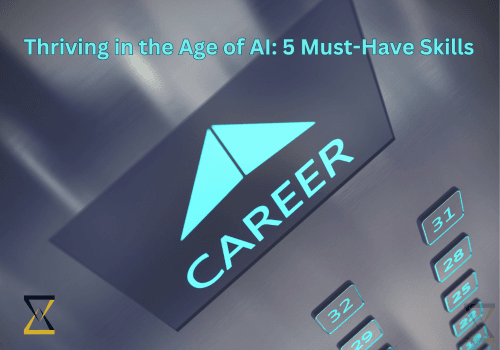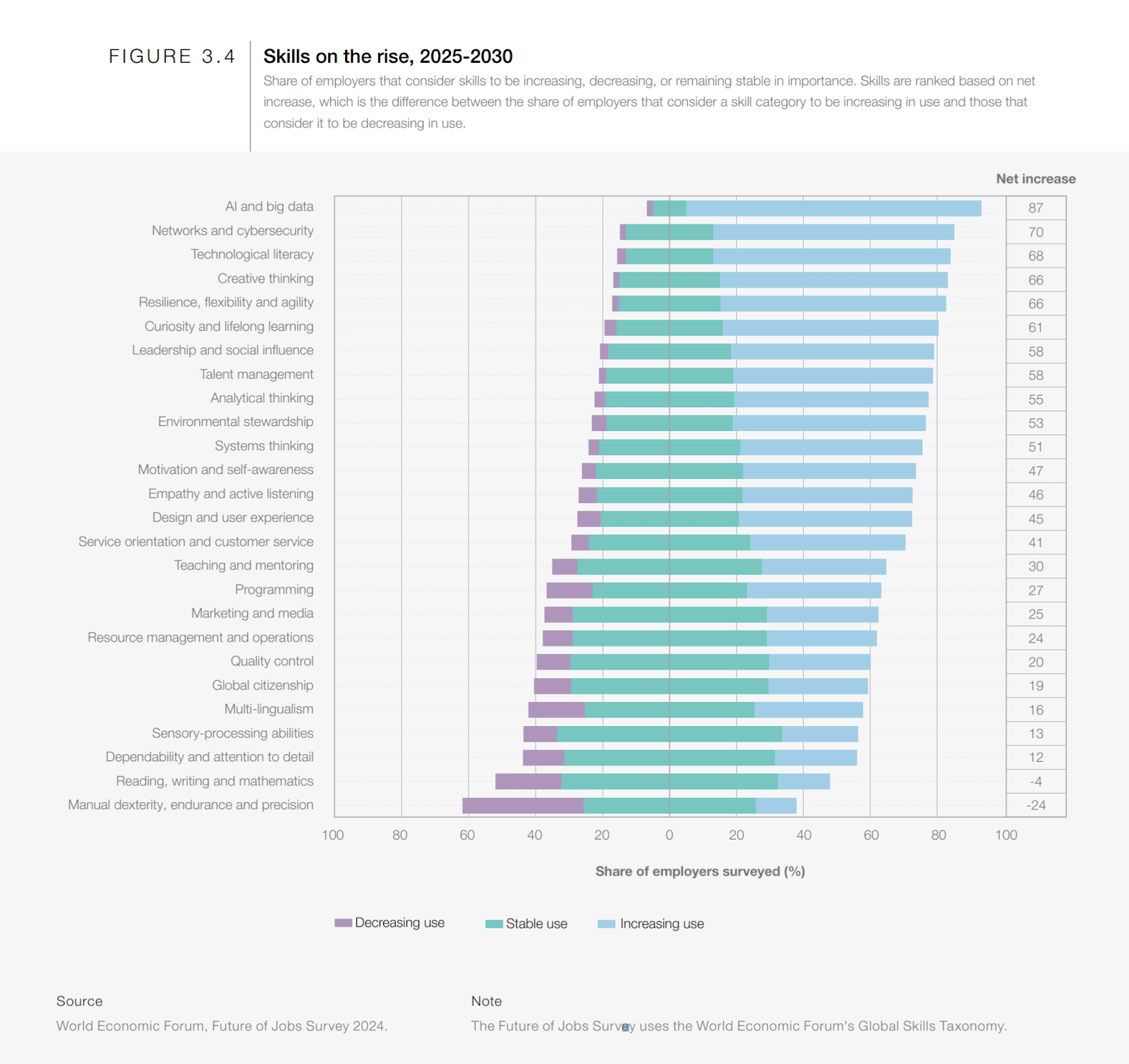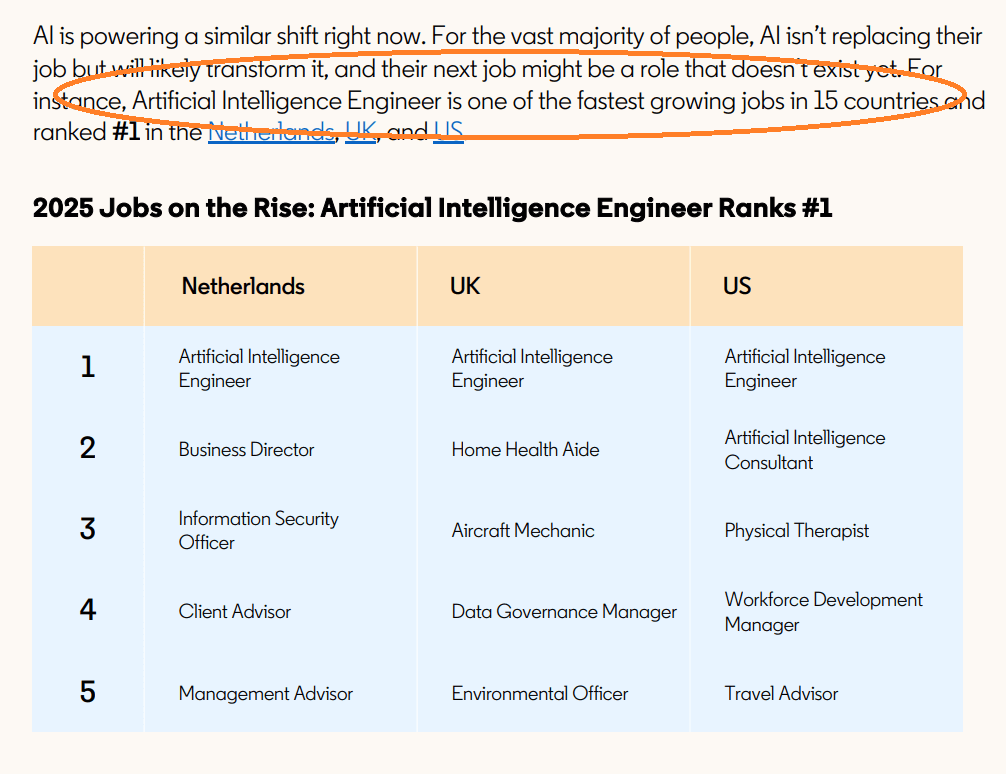
Advanced AI technologies, including generative AI (Gen AI) tools that can communicate with humans conversationally, are transforming what it means to work and collaborate. Forecasts point to a future in which humans and machines cooperate and sometimes compete in the workplace.
What skills will be valued in this new workplace?
EY Parthenon estimates that 59% of jobs globally have high to moderate exposure to AI. Physical AI is coming, too. The American Enterprise Institute (AEI) predicts that by 2035, 1.3 billion AI-robots will enter the machine workforce.
But adding AI and automation to the mix doesn’t always mean people are being replaced. Labor replacement is just one way AI and automation will affect the future of work.
Many futurists and workforce consultants predict companies will gain the most value from AI-human collaborations.
These experts advise that in the future of work, people’s distinctively human skills will be necessary to complement and guide the technical skills of their mechanical teammates.
Maximizing the value from these human and artificial intelligence collaborations will require making some adjustments, though. Much like any other allocation of resources, striking the right balance is key.
But what is the right balance? Several studies reveal the answers.
Which skills should people develop to advance their careers and maintain their side of the value equation?
One thousand employers from around the world say they’ll be on the lookout for these skills
For its Future of Work Report 2025, the World Economic Forum (WEF) asked employers to list the skills that were in-demand now and which ones they expected to be important in the future.
The following chart illustrates the results of the WEF’s survey of 1000 global employers, employing more than 14 million people across 22 industries.

Not surprisingly, AI and big data holds the top spot for “most likely to be needed” skills with employers predicting a net increase in demand of 87% for this skills combo. In second place, networks and cybersecurity capabilities will be popular as all that data has to be integrated and protected.
General technological literacy takes third place.
But after these top three, the focus shifts away from technical skills to include human intelligence and soft skills such as:
- creative thinking,
- resilience, flexibility and agility,
- curiosity and lifelong learning,
- leadership and social influence,
- analytical and systems thinking,
- Motivation and self-awareness, and
- Empathy and active listening.
Employers were also thinking about the future of the planet and the future workforce needs when they completed this survey. Talent management and environmental stewardship made it into the top ten on this list of rising and declining skills.
Many of the skills appearing in the WEF survey results also surfaced in LinkedIn’s January 2025 Work Change Report: AI Is Coming to Work.
And LinkedIn’s top job results point to many of the same trends recognized by WEF’s rising skills data.

Jobs including AI engineer, AI consultant, and data governance manager show up in the top five across various regions. But so do roles in healthcare, environment and workforce development.
5 must-have career skills for humans entering the age of AI
While the specific skills needed for future jobs will change, there are some core competencies that professionals, job seekers and entrepreneurs should cultivate to ensure future career success. These skills have always added value. But as AI takes basic cognitive tasks, humans’ intelligence will be reserved for tasks requiring more complex interactions and higher-level thinking.
Strong communication skills never go out of style
Linked reports that communication was the number one most in-demand skill in 2024. This skill outranked AI-literacy, data analytics and a host of other more technical capabilities. Meanwhile, WEF’s report predicts a 45% net increase in demand for empathy and active listening skills.
Effective workplace communication requires message senders to tailor their message to their audience and message receivers to intake and translate that message correctly.
When coworkers can’t communicate effectively with one another or a business’s customers it costs those businesses time and money.
Grammarly reports that organizations lose more than a trillion dollars each year because people can’t get answers they need or can’t resolve situations efficiently.
The increasing expectation that people and AI tools will need to work side-by-side heightens the importance of good communication.
Gen AI tools may solve some of your communication problems, but only if you can effectively communicate your wishes to your AI tool. Plus, miscommunications can go wrong at a much faster pace when AI helps us develop and distribute them.
LinkedIn’s CEO writes that lifelong learning, empathy, ethical judgement and leadership are skills for which AI is no match for human intelligence.
Teamwork will continue to make the dream work in the future
There are limits to how much one individual can accomplish, even with the assistance of an army of AI tools. Team-based operational structures enable organizations to tackle complex, cross-functional tasks while leveraging each individual’s strengths.
This type of team-powered output requires more than just effective communication; it requires a full range of collaborative skills.
These collaboration skills include the ability to:
- Interpret verbal and non-verbal communications and cues,
- Craft responsive messages suitable for various audiences,
- Identify and solve problems,
- Exercise and share leadership, and
- Compromise to achieve mutual goals.
Team members also have to trust one another and employ empathy, as well as adapt to one another’s styles and respond to changing circumstances without losing focus on the ultimate purpose of their collaboration.
Human creative thinking skills will power the future innovations we’ve not imagined yet {#human-creative-thinking-skills-will-power-the-future-innovations-we’ve-not-imagined-yet}
It may seem as if the latest wave of AI applications are making humans’ creative thinking abilities obsolete. However, experts predict that creative thinking will remain an area in which humans hold an advantage.
Gen AI applications may produce creative outputs such as artwork or novels. But these tools don’t possess the level of imagination that humans bring to creative tasks. Further, while AI excels at detecting patterns buried in the data, human imagination excels at creating patterns and sometimes, capriciously ignoring them.
Sometimes doing what doesn’t make sense or seems impossible works.
Deep, creative thinking is a skill you can nurture by exploring topics outside your expertise. Engage in unstructured thinking, allowing your mind to wander outside the parameters of your tasks or role to build your creative skills as well.
Finally, don’t underestimate the power of play to inspire your creativity. As our own Ana Bacioiu writes in, Why is play important in entrepreneurship and business? playfulness fosters innovation, experimentation and learning.
The ability to adapt will be a career necessity
Humans and AI have this in common: Flexibility, adaptability and lifelong learning are essential skills for the future of both.
Practically speaking, adaptation and continual learning may be unavoidable. LinkedIn’s 2025 Work Change Report predicts that 70% of the skills used in most jobs will change by 2030. This report also notes that even among entry-level candidates, 38% of global executives are looking for agility as a skill.
AI-literacy will be a critical future skill for professionals and entrepreneurs
It’s true that not every job has a high level of AI exposure. Roles in childcare, food preparation, healthcare, skilled trades and other hands-on positions are least likely to be affected by AI’s expansion into the workplace.
But the number of roles AI will touch is growing as is employer demand for individuals with AI-literacy. Professionals with these skills will have a wider range of roles from which to choose.
Likewise, AI-literate entrepreneurs will be prepared to use current and new AI applications to maximize their productivity and grow their businesses.
What does it mean to be AI-literate? Well, that’s likely to be a moving target. Prior to ChatGPT’s launch in 2022, AI-literate typically meant being able to use an AI-powered analytics tool. Today, it may mean being able to use Grammarly’s advanced features.
Understanding what current AI tools can do, the ethical and legal considerations for using AI, and how to maximize the benefits you gain from AI-powered tools will be necessary skills in the future.
Are you ready to build your skills for the future? Check out the Pitch Labs Library to learn about business operations, leadership and building your future success.

Leave a Reply